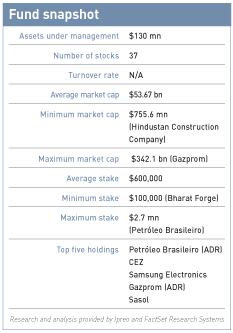Bryan Collings, fund manager of Hexam Global Emerging Markets talks about how he chooses investments, tax reform in Russia, and the future of emerging markets
No surprise that this Stellenbosch University-educated fund manager – he read economics – is bullish on hard and soft commodities, especially coal, potash and iron ore. ‘I would say our philosophy is high conviction and a ‘best ideas’ approach,’ he explains. ‘We extract a lot of value from the sheer concentration of our stocks.’ At current levels, that’s just 37 stocks, so there’s no shortage of super-concentrated conviction.
Despite Collings’ modest $130 mn fund being barely two years old, last year it beat the MSCI benchmark index by 10.4 percent. ‘Our approach is a blend, neither top-down nor bottom-up,’ he explains. ‘Other fund managers tend to focus on the wider universe outside, supported by large teams. We’ve taken the opposite approach: a small team all sitting within inches of each other. It’s about focusing on what’s in our own ideas pool, rather than trying to extrapolate from vast amounts of data and random information.’
Number crunching
Collings, 42, cares little for annual reports and their corporate aggrandizing, preferring to focus on the numbers. ‘Send me a spreadsheet,’ he says. ‘This is audited information I can work from, or stress-test on what it could become. A good company is not necessarily a good stock. Similarly, a company that’s very attractive on valuation grounds but has little growth in it does not make a good investment.’
The UK-based fund manager is certainly comfortable taking a contrary tack. For instance, there’s substantial investor interest in Brazil right now – an unsurprising fact, given that the Brazilian market is up more than 20 percent in the last year. Collings is not a fan, however, preferring to look to the Far East.
‘Brazil’s got high inflation,’ he states bluntly. ‘I’m not impressed by the rate of fiscal reform there. India, by contrast, is more interesting: it has better valuations. It also has some macro problems like inflation but, if interest rates go down, India will take off.’
Traditionally, many investors have taken positions in emerging market funds to add a little zest around the edges of what are otherwise fairly stolid portfolios. But Collings believes more money will shift to portfolios similar to his as western inflation begins to take hold and wages and disposable income struggle. That means increased risk-taking for more investors in places where transparency and governance isn’t great, like Russia.
‘We didn’t own any Russian oil for some time,’ Collings points out. ‘But after a visit to Russia last year we realized tax reform was going to happen. We have a Russian partner at Hexam who had a more coherent view of the tax system. Yes, the transparency – at state level – is not there. But the Russian system doesn’t go through all the political shenanigans of elsewhere; it’s a lot more command-and-control in the way things are undertaken. This is good and bad news for investors.’
Indeed it is, as BP, embroiled in a nasty and very public power struggle with its Russian oil partners over investor rights, will attest. Yet a recent tax reform has now made it easier for Russian companies to raise debt on a long-term basis, says Collings.
‘We don’t know all the details at this stage but there is going to be a lot of loosening up,’ he adds. ‘You most certainly want to know about Russian oil.’
What Collings himself wants to know from IROs is straightforward: a clear explanation of cash flow and return on capital. ‘If return on capital is in excess of 20 percent, inflation is 3 percent and my hurdle rate is 2 percent, we’re in good shape,’ he asserts. ‘What we’re trying to do here essentially is save, but at an accelerated rate for our investors.’ And if an IRO can’t give a convincing account of why return on capital is dropping and what the company is doing about it, it’s a short conversation. Talking points
Talking points
Unfortunately, Collings says too many IROs give a pretty reasonable story about the present and past, but fail to think in any way reflectively or thoughtfully about the company’s future.
‘They take the safe route,’ he says with frustration. ‘There might be some explanation about cost cutting but rarely any plan beyond that. IROs need to articulate their story. They need to define clearly what the company is and what it could be in the future. You need to have a view on the domestic environment in which you operate, and in today’s world of free-flowing funds, you absolutely have to give that. Investor relations is not a sales job – it’s an information job.’
This is obviously true, although you suspect Collings, reeking of conviction with his South African clipped vowels, is a pretty effective salesman himself. ‘When was the last time emerging markets had a crisis?’ he asks rhetorically at one point, stressing the increased robustness of much of the Asian markets. And it’s a fair point: the so-called Asian Tiger Crisis was a decade ago.
Collings also willingly accepts the risks – sometimes the very high risks – that emerging markets can pose. ‘It’s all relative,’ he says. ‘There’s no structure in the world that offers you the precise level of transparency and exact set-up you sometimes want. But things are improving in many places; if you wait too long, you might miss the journey.’










